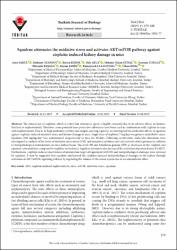Squalene attenuates the oxidative stress and activates AKT/mTOR pathway against cisplatin-induced kidney damage in mice

Göster/
Erişim
info:eu-repo/semantics/openAccessAttribution 4.0 Internationalhttps://creativecommons.org/licenses/by/4.0/Tarih
2019Yazar
Sakul, ArzuOzansoy, Mehmet
Elibol, Birsen
Ayla, Şule
Günal, Mehmet Yalçın
Yozgat, Yasemin
Basağa, Hüveyda
Şahin, Kazım
Kazancıoğlu, Rümeyza
Kılıç, Ulkan
Üst veri
Tüm öğe kaydını gösterKünye
Sakul, A, Ozansoy, M., Elibol, B., Ayla, Ş., Günal, M. Y., Yozgat, Y. … Kılıç, U. (2019). Squalene attenuates the oxidative stress and activates AKT/mTOR pathway against cisplatin-induced kidney damage in mice. Turkish Journal of Biology, 43(3), 179-188. https://dx.doi.org/10.3906/biy-1902-77Özet
The clinical use of cisplatin, which is a first-line anticancer agent, is highly restricted due to its adverse effects on kidneys that lead to nephrotoxicity. Therefore, some potential reno-protective substances have been used in combination with cisplatin to cope with nephrotoxicity. Due to its high antitumor activity and oxygen-carrying capacity, we investigated the molecular effects of squalene against cisplatin-induced oxidative stress and kidney damage in mice. Single dose of cisplatin (7 mg/kg) was given to male Balb/c mice. Squalene (100 mg/kg/day) was administered orogastrically to mice for 10 days. Following sacrification, molecular alterations were investigated as analysis of the levels of oxidative stress index (OSI), inflammatory cytokines and cell survival-related proteins in addition to histopathological examinations in mice kidney tissue. The level OSI and Interferon-gamma (IFN-gamma) decreased in the cisplatin and squalene cotreated mice compared to cisplatin-treated mice. Squalene treatment also increased the activation of protein kinase B (AKT). Furthermore, cisplatin-induced inactivation of mammalian target of rapamycin (mTOR) and histopathological damages were reversed by squalene. It may be suggested that squalene ameliorated the cisplatin-induced histopathological damages in the kidney through activation of AKT/mTOR signaling pathway by regulating the balance of the redox system due to its antioxidative effect.
WoS Q Kategorisi
Q3Scopus Q Kategorisi
Q3Kaynak
Turkish Journal of BiologyCilt
43Sayı
3Koleksiyonlar
- Makale Koleksiyonu [301]
- Makale Koleksiyonu [3777]
- PubMed İndeksli Yayınlar Koleksiyonu [4230]
- Scopus İndeksli Yayınlar Koleksiyonu [6574]
- TR-Dizin İndeksli Yayınlar Koleksiyonu [2177]
- WoS İndeksli Yayınlar Koleksiyonu [6631]


















